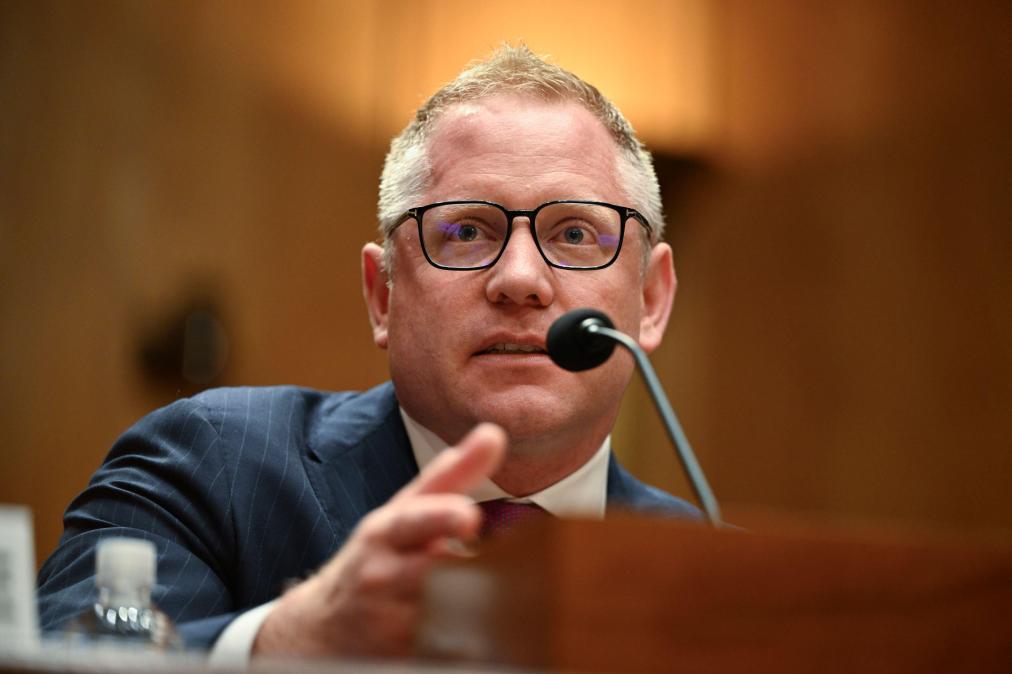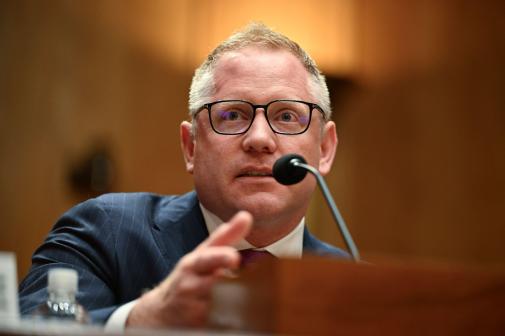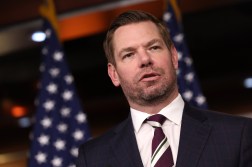Plankey vows to boot China from U.S. supply chain, advocate for CISA budget

President Donald Trump’s pick to lead the Cybersecurity and Information Security Agency told senators Thursday that he would prioritize evicting China from the U.S. supply chain, and wouldn’t hesitate to ask for more money for the shrunken agency if he thought it needed it.
“If confirmed it will be a priority of mine to remove all Chinese intrusions, exploitations or infestation into the American supply chain,” Sean Plankey told Rick Scott, R-Fla., at his confirmation hearing before the Homeland Security and Governmental Affairs Committee. Scott had asked Plankey about reports of Chinese infiltration of U.S. energy infrastructure.
Should he be confirmed for the role, Plankey is set to arrive at an agency that has had its personnel and budget slashed significantly under Trump, a topic of concern for Democratic senators including the ranking member on the panel vetting him, Gary Peters of Michigan. Peters asked how he’d handle the smaller CISA he’s inherited while still having a range of legal obligations to fulfill.
“One of the ways I’ve found most effective when you come in to lead an organization is to allow the operators to operate,” Plankey said. “If that means we have to reorganize in some form or fashion, that’s what we’ll do, I’ll lead that charge. If that means we need a different level of funding than we currently have now, then I will approach [Department of Homeland Security Secretary Kristi Noem], ask for that funding, ask for that support.”
Under questioning from Sen. Richard Blumenthal, D-Conn., about whether he believed the 2020 election was rigged or stolen, Plankey, like other past Trump nominees, avoided answering “yes” or “no.”
At first he said he hadn’t reviewed any cybersecurity around the 2020 election. He then said, “My opinion on the election as an American private citizen probably isn’t relevant, but the Electoral College did confirm President Joe Biden.”
Blumenthal pressed him, saying his office was supposed to be above politics, and asked what Plankey would do if Trump came to him and falsely told him the 2026 or 2028 elections were rigged.
“That’s like a doctor who’s diagnosing someone over the television because they saw them on the news,” Plankey answered.
Chairman Rand Paul, R-Ky., rebutted Blumenthal, saying “CISA has nothing to do with the elections.” But Sen. Josh Hawley, R-Mo., later asked Plankey about CISA’s “important” role in protecting election infrastructure, and asked how he would make the line “clear” between past CISA disinformation work that Republicans have called censorship and cybersecurity protections.
Plankey answered that Trump has issued guidance on the protection of election security infrastructure like electronic voting machines, and it’s DHS’s job “to ensure that it is assessed prior to an election to make sure there are no adversarial actions or vulnerabilities in it,” something he’d focus on if Noem tasked CISA with the job.
Plankey said he would not engage in censorship — something his predecessors staunchly denied doing — because “cybersecurity is a big enough problem.” His focus would be on defending federal networks and critical infrastructure, he said. To improve federal cybersecurity, he said he favored “wholesale” revamps of federal IT rather than smaller fixes.
The Center for Democracy and Technology said after Plankey’s hearing it was concerned about how CISA would approach election security.
“CISA has refused to say what its plans are for the next election, and election officials across the country are flying blind,” said Tim Harper, senior policy analyst on elections and democracy for the group. “If CISA is abandoning them, election officials deserve to know so they can make plans to protect their cyber and physical infrastructure from nation-state hackers. Keeping them in the dark only helps bad actors.”
Plankey indicated support for the expiring State and Local Cybersecurity Grant Program, as well as the expiring 2015 Cybersecurity and Information Sharing Act, both of which are due to sunset in September.
Paul told reporters after the hearing that he planned to have a markup of a renewal of the 2015 information sharing law before the September deadline, with language added to explicitly prohibit the Cybersecurity and Infrastructure Security Agency from any censorship.
Plankey’s nomination next moves to a committee vote, following an 11-1 vote last month to advance the nomination of Sean Cairncross to become national cyber director. Plankey’s nomination would have another hurdle to overcome before a Senate floor vote, as Sen. Ron Wyden, D-Ore., has placed a hold on the Plankey pick in a bid to force the administration to release an unclassified report on U.S. phone network security.
“The Trump administration might not have been paying attention, so I’ll say it again: I will not lift my hold on Mr. Plankey’s nomination until this report is public. It’s ridiculous that CISA seems more concerned with covering up phone companies’ negligent cybersecurity than it is with protecting Americans from Chinese hackers,” Wyden said in a statement to CyberScoop. “Trump’s administration won’t act to shore up our dangerously insecure telecom system, it hasn’t gotten to the bottom of the Salt Typhoon hack, and it won’t even let Americans see an unclassified report on why it’s so important to put mandatory security rules in place for phone companies.”






